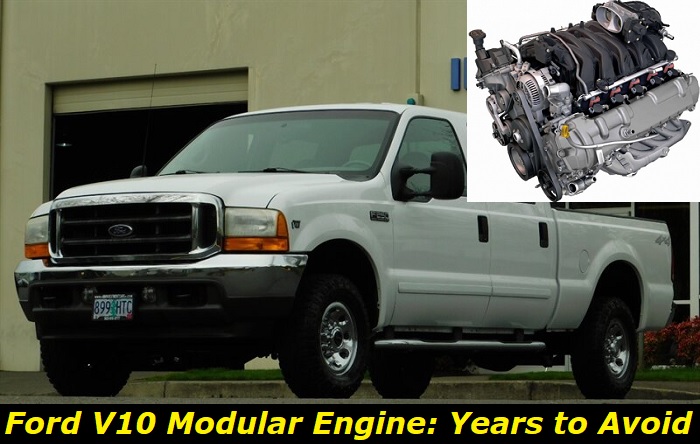Among high-performance engines, the Ford V10 legendary unit is probably one of the most underestimated ones. It's a truck engine that has also been used in numerous RVs, project cars, vans, etc.
Key features and my opinion about the engine
- Production years:1997-2019
- Average lifespan of V10 Triton:350,000-500,000 miles
- Fuel supply type:port injection
- Power range:288-362 hp
- Fuel efficiency:awful
- Engine block material:cast-iron
- Engine reliability score:high
- The most common problems:exhaust issues, spark plugs dying too soon, enormous fuel consumption.
Although the 1997-2005 V10 engines are still good, I strongly recommend considering newer engines (2005-2019) for purchase.

Here's what exactly we will be talking about:
- Ford V10 years of production and some facts.
- What are the worst years of the V10 engine by Ford?
- What are the major common problems with these engines?
- Should you avoid buying a vehicle powered by this engine?
Let's get started!
What should you know about the Ford V10 engine?
When the 7.5-liter engine died, Ford needed to do something to satisfy commercial clients and to build their heavy-duty trucks with. They came up with the idea to add two spare cylinders and they created the 6.8L V10 Triton in 1997. The engine offered 275 horsepower and then upgraded to 310 hp. But the best thing was the 425 lb-ft torque with the latter upgrade to 460 lb-ft.
The engine was upgraded several times - in 2000 and in 2005. The engine was produced up to 2021 for school buses and some other special transport, but in trucks, it was discontinued in 2010 with only some F450 and F550 chassis using it up to 2019. Hundreds of thousands of these engines were made and are still running all over America.
Here are some things you should know about these engines:
- with the displacement of 6,760cc, the V10 engines appeared to be the biggest gasoline engines in the lineup of the Blue Oval for many years;
- basically, the construction wasn't very new, it was a Modular V8 engine with just another 2 cylinders added to the unit;
- the engine was first made to be fitted in large trucks, but later they used it also for E-series vans, city buses, school buses, and also for the Ford Excursion SUV;
- the worst thing that comes with this engine is fuel economy - it offers between 7 and 10 MPG which is ridiculous currently;
- first versions of the engines had 2 valves per cylinder, in 2005 Ford added another valve to each cylinder of the V10 engine making it much more powerful;
- also, the V10 was used in many performance cars with numerous upgrades like the Ford GT;
- now, many car geeks choose these engines as a base for their project vehicles, especially trucks, RVs, or vans;
- these engines cost less to operate than high-torque diesel engines with similar torque, but of course, they will drink twice as much fuel as their diesel counterparts.
So, the V10 engines by Ford have a lot of advantages and some flaws, of course. Among their pros, we can think of durability, simple construction, cheap maintenance, and overall dependability. The engine will roughly go about 300,000 miles in a vehicle that is not used for towing and hauling big weight and up to 200,000 miles in a heavy-duty vehicle.
We also know that some city buses hit 500,000 miles with these engines and then they need an overhaul to keep running. It's nearly always possible to repair them just by changing piston rings, valve seals, and some other minor parts to keep going. So, a million miles may be possible if the engine is thoroughly looked after.
What are the worst and best years for the V10 engine?
It's very hard to say for sure which years you should avoid. We don't notice any major difference in the overall longevity of the early (1997-2005) and late (2005-2019) engines. They are all pretty good and durable if they are maintained as they should. Nothing will spoil your mood very much, but read the "problem" section of this article to learn more.
We would buy a fresher engine if we had a choice. Just because of these reasons:
- the V10 engines made after 2005 have 3 valves per cylinder and higher performance while the older ones have 2 valves and less power and torque;
- newer engines are more likely to be in better condition just because they are fresher - all tubes, gaskets, and fastenings work better here;
- also, these engines are likely to have less mileage on them which is important when you buy an engine that has already been taken off the vehicle and you can't look at the mileage;
- after several upgrades, the engines became a little more durable, some common problems were solved by Ford engineers which is also important.
So, we would hunt for a new engine with fewer years and miles on it if we needed to buy one. But when you are looking for a truck, you are most likely able to find the 12-14-year-old vehicle at best. Unfortunately, after that Ford stopped making this engine available in massively produced trucks and SUVs.
If you happen to buy the engine that was used in a school bus or a city bus, you will suffer a lot. These engines usually have half a million miles on them and are not in their best condition at all.
What are the common problems with the Ford V10 engines?
We've already discussed these engines in our blog, but today we specifically focus on their best and worst years. So, we'll try to figure out if these common problems are true for all years. And here you will find the big difference between the earliest and the latest V10 engines made by Ford.
Here are the problems you should consider.
1. Spark plugs jumping out
It may sound too weird, but in the V10 engines made before 2005 spark plugs used to jump out of the spark plug wells because of spoiled thread, and this led to the immediate harsh operation of the engine.
The problem doesn't seem that serious until you come to a mechanic and they will tell you how much it costs to solve the issue. Fortunately, newer engines don't have this problem.
2. Exhaust leaks
Exhaust manifolds are not the best ones in this engine. Well, the manifolds themselves are OK, but the bolts may fail. It doesn't mean you may lose your manifold on the way, but exhaust leaks will follow your V10 engine now and then. It means that the manifold will need your attention from time to time.
Again, the problem with bolts and threads - this seems weird. What other bolts can blow out and cause problems with these engines? It's good that exhaust leaks will only slightly affect the performance of your engine.
3. Gas mileage problem
One more issue is the deterioration of fuel economy. After the engine has already done 100,000 miles, it may show bad gas mileage because of different minor issues. This may be a problem with fuel injection or maybe an issue with the fuel pump. But you will have to react quickly because otherwise, you will go to fuel pumps more often than you may afford.
Gas mileage is an initial problem you can do nothing with. But when it gets even worse, your Ford V10 becomes irrational to drive at all.
4. Fluid leaks
The older engines will show some leaks of coolant and oil just because gaskets and O-rings may fail because of their age. You will constantly see some drops of oil on the floor of your garage or on the drive.
Of course, you should always do something when you find a leak, but once you solve one leak, another is on its way.
Should you avoid the Ford V10 engine?
Unfortunately, our verdict is pretty straightforward: this engine is now optimal only for very specific purposes. For example, it may be good for big motorhomes. If you are building a project truck, it's much better to choose something else. If you just want to buy a used truck or SUV, go for diesel versions to avoid high fuel consumption and some other problems with this engine.
We wouldn't recommend buying a Ford V10 in 2022-2023 because you have a lot of other alternatives. Current turbocharged engines seem like a good idea in terms of longevity, consumption, and other features. We would avoid the V10 because of a lot of things, but it's still OK for buses, big RVs, and also commercial use.
Final words
You can see now that the V10 engine made by Ford has its pros and cons. It's a good engine for the early 2000s, but it's not the best option for today. Very low gas mileage, a lot of minor problems, age, and possible wear should make you think twice before you give your money for this unit.
About the authors
The CarAraC research team is composed of seasoned auto mechanics and automotive industry professionals, including individuals with advanced degrees and certifications in their field. Our team members boast prestigious credentials, reflecting their extensive knowledge and skills. These qualifications include: IMI: Institute of the Motor Industry, ASE-Certified Master Automobile Technicians; Coventry University, Graduate of MA in Automotive Journalism; Politecnico di Torino, Italy, MS Automotive Engineering; Ss. Cyril and Methodius University in Skopje, Mechanical University in Skopje; TOC Automotive College; DHA Suffa University, Department of Mechanical Engineering






Add comment